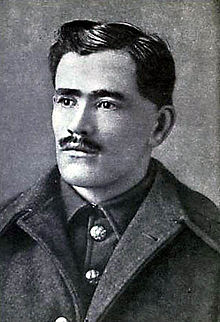
For a long time Remembrance Sunday was looked upon with deep suspicion here in Ireland - another trapping of Imperialist British rule. The poppy was almost forbidden, and those who wore it thought to be oddballs at best and traitors at worst. A great many Irish citizens felt alienated because as men and women who had taken part in the Great War and the Second World War their loyalty to the "Republic of Ireland" was in question. It was decided by someone in the dim and distant past that a real Irish nationalist would not have gone to fight for the Sasanach*. Yet plenty of proud Irishmen and women went to serve in the British Army and other national armies because they believed that the World Wars were not about British Imperialism, but something else.
Thankfully things are changing and today many in Ireland can feel proud to be Irish, loyal to the Republic and still remember the men and women who gave their lives in the cause of freedom and peace in the World Wars and other international conflicts. The poppy, the symbol of this commemoration, is not blooming with great abundance in Ireland yet, but that may change.
My personal connection with the Wars is twofold. My great-grandfather fought with the British Army in the First World War and sustained injuries, including shellshock. A cousin of my mother fought in the Second World War, again a member of the British Army, and was one of those who barely escaped with his life at Dunkirk - he never spoke about happened him there. I did not know either of these two relations, but their stories were recalled by members of my family, and it is only of late that I am beginning to take pride in their heroism and sacrifice: they believed in freedom so much they were willing to be ostracised in their own country for their stand.
There are also two other connections: my growing devotion to Fr Willie Doyle, proud Irishman and priest who died on the battlefield in Passchendaele in the Third Battle of Ypres, offering up his life to tend to soldiers who were injured and dying. And then there is a local poet here in County Meath, Francis Ledwidge, a committed nationalist, who died a few weeks earlier in July 1917, also in that battle. Ledwidge is one of Ireland's finest lyrical poets and he was a major influence on our late Seamus Heaney. (I wonder, did Francis know Fr Doyle? Francis, we are told, had been to confession and Mass, and had received Holy Communion on the morning he was killed - so he was committed to his faith: perhaps he may have been ministered to by Fr Willie).
Fr William Doyle, SJ, MC and Francis Ledwidge
When we mark Remembrance Sunday, we remember these heroic Irishmen and many others, perhaps some from our own families, who went to serve in the cause of freedom. Many of these were men of peace - on both sides of the conflict. Chief among them was Blessed Charles, Emperor of Austria-Hungary who, as soon as he came to the throne in 1916 began negotiations to end the war, even accepting defeat if necessary. He failed in that endeavour because the leaders of the other countries in the conflict had gone too far, the taste of blood and the lust for pure victory had so intoxicated them they were unwilling to listen to reason. Many historians are not favourable to Charles, they seem him as a weak man, incapable of carrying out his duties and whose efforts were doomed to failure from the start. Well, that may be their opinion, Saints are rarely understood by the secular - they often appear weak and other worldly, but the fact remains: if people had listened to Charles the war would have ended much sooner.
That said, let us remember in our prayers all those who died in these conflicts and pray that peace may finally come into the hearts of men and women, for it is only when peace reigns there that we will see an end to war.
______________________________________________________
* (Irish: "Saxon", term of abuse in Ireland for British)


No comments:
Post a Comment